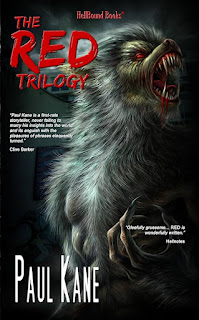Last year, I dipped my toes into what I don't normally venture into, and that's paranormal romance. What originally attracted me to the book I chose was that it was described as Supernatural, only if Sam and Dean were "togther" (wink, wink). It was also described as Urban Fantasy. When the horror sections disappeared from the bookstores, urban fantasy, with its vampires, werewolves, and witches (oh my!), is watch scratched my horror itch. And while I liked the characters, and I liked the storyline, I was put off by all the sex. Not that I'm a prude or anything, but it was too much, and the guys boinking every chapter detracted from the story.
Well, this year I decided to dip my toes into that water again, but this time I sought out a male author, not a female author and not a female author using a male pseudonym. I settled on Richard Amos's "Necromancer Rising" series. Why? Because with the central character being a necromancer, it harkened back to my early UF days with the Anita Blake series by Laurel K. Hamilton.
In Death Eternal, Book 1 of a 4-book series, we're introduced to Marcel August, the necromancer of the series. We also find out that, thanks to Death walking off the job 20 years ago, the necromancers have gained more power. Where previously there were able to raise and speak to the dead for brief periods, usually to help with police investigations, they can now scan, reanimate, control, bind, and release ghosts. You might think the job of a necromancer would be boring, sitting around waiting for the police to require your assistance. Not so. Not now. Not since Death walked off the job. You see, now there's nobody to escort the ghosts to the spirit plain, so they're stuck here.
During the course of a routine poltergiest call, Jenn, Marcel's partner and BFF, is injured. The High Warden basically blames Marcel for what happened, even though it wasn't his fault. Their routine call had been interrupted by a rogue necromancer and a zombie. Rogues are necromancers who have gone crazy, unable to handle the power upgrade because they opted not to take the Necrojuice, which necromancers must inject on a regular basis in order to keep the powers under control.
Jump to Marcel's transfer out of London to the town of Oakthorne, where upon his arrival, he's encounters a ghost named Louise and is abducted by a rogue and almost killed, until he's rescued by a tall, dark, and handsome stranger.
Yep, you guessed it. Death.
And the two men immediately feel some connection. Under the guise of wanting to help Marcel find out what happended to a missing ghost, Death admits to being fascinated by Marcel, but there's something more going on. Needless to say, the sparks fly and the clothes eventually come off. But surprisingly, it doesn't happen for a while. And there's actually a story here, a mystery that becomes the major focus of the novel despire the overarcing storyline, which is Death and Marcel finding a way to love safely. What do I mean by that? Not giving that away. You'll have to read the book to find out.
I said previously that I was originally drawn to the series because of the echoes of Anita Blake, a series I loved, to a point, but as I was reading, I also picked up echoes of Richelle Meade's Georgina Kincaid series, another UF series I loved. So I was surprised to find that the series wasn't a tired retread of something that I'd read before. The story is fast-paced and action-packed (Amos knows how to keep you on the edge of your seat), and the author has populated his world with cast of likable and not-so-likable characters. Outside of Marcel and Death, my favorite here was Louise, an overly chatty ghost who Marcel befriends (this is the ghost Marcel encounters the night he arrives in Oakthorne).
I mentioned previously that the clothes don't come off for a while, and that was the only shadow hanging over my head as I was reading. I was totally caught up in the story, but with every turn of the page, I cringed, wait for the boinking to start and the story to derail. Thankfully, it never happens. I'm not talking about the boinking (this is, afterall, billed as a romance in addition to an urban fantasy novel); I'm talking about this not turning into an orgy and the story forgotten. Amos has created a well-balanced story that never lets up. The reader is compelled to keep reading to find out what happens next, and the brakes are never put on for the gratuitous sex scene. When it happens, it happens naturally as part of the narrative, not dropped in because the author thinks now is a good time for a boink. And surprisingly, I didn't even mind that this ended on a cliffhanger, which I usually hate, only because the next book was readily available. Also surprisingly, I jumped right into the next book. Normally, if I like a series, I space the books apart in order to savor it and enjoy the company of the characters, but that didn't happen here. Ten days, four books. Not because I wanted to get it over with, but because I needed to know what happened next, not just with Marcel and Death, but with the mystery itself, which only deepened and evolved with each book. If all of Amos's books are like this, I'm in big trouble, especially if the series runs long. It means I'll need to carve out large blocks in my reading schedule.And trust me, I will be returning to this author.
Recommended? Most definitely, especially if you're a fan of the early Anita Blake books.








